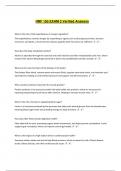HNF 150 EXAM 3 Verified Answers
What is the role of the hypothalamus in hunger regulation?
The hypothalamus controls hunger by responding to signals such as blood glucose levels, stomach
hormones, and leptin, a hormone that reduces appetite when fat stores are sufficient. ✔️✔️
How does the body metabolize alcohol?
Alcohol is absorbed through the stomach and small intestine and then metabolized by the liver, where
enzymes like alcohol dehydrogenase break it down into acetaldehyde and then acetate. ✔️✔️
What are the main functions of the kidneys in the body?
The kidneys filter blood, remove waste and excess fluids, regulate electrolyte levels, and maintain acid-
base balance, helping to control blood pressure and support overall homeostasis. ✔️✔️
Why is protein synthesis important for muscle growth?
Protein synthesis is the process by which the body builds new proteins, which are necessary for
repairing and growing muscle tissue after exercise, helping to increase muscle mass. ✔️✔️
What is the role of insulin in regulating blood sugar?
Insulin is a hormone produced by the pancreas that helps cells absorb glucose from the bloodstream,
lowering blood sugar levels and providing energy for body functions. ✔️✔️
How does fiber help maintain digestive health?
Fiber adds bulk to stool, promoting regular bowel movements, and helps prevent constipation. It also
supports gut microbiota, which can improve overall gut health. ✔️✔️
What is the impact of a high-sodium diet on cardiovascular health?
Excessive sodium intake can lead to high blood pressure, which increases the risk of heart disease,
stroke, kidney disease, and other cardiovascular issues. ✔️✔️
,What is the primary function of cholesterol in the body?
Cholesterol is essential for building cell membranes, producing hormones like estrogen and
testosterone, synthesizing vitamin D, and producing bile acids for fat digestion. ✔️✔️
How does the process of gluconeogenesis work?
Gluconeogenesis is the metabolic process in which the body creates glucose from non-carbohydrate
precursors like amino acids and glycerol, mainly occurring in the liver. ✔️✔️
Why is calcium important for muscle contraction?
Calcium ions bind to proteins in muscle fibers, allowing the interaction between actin and myosin
filaments, which is essential for muscle contraction and movement. ✔️✔️
What is the effect of chronic stress on metabolism?
Chronic stress leads to elevated cortisol levels, which can increase appetite, alter fat storage, and
decrease muscle mass, potentially leading to weight gain and metabolic disturbances. ✔️✔️
What is the role of the liver in detoxification?
The liver processes and neutralizes toxins in the body by breaking them down into less harmful
substances, which are then excreted through urine or bile. ✔️✔️
What are the benefits of a Mediterranean diet for heart health?
The Mediterranean diet, rich in fruits, vegetables, whole grains, healthy fats (especially olive oil), and
lean proteins, has been shown to reduce the risk of cardiovascular disease by lowering cholesterol and
inflammation. ✔️✔️
How does vitamin E function as an antioxidant?
Vitamin E acts as an antioxidant by neutralizing free radicals, protecting cells and tissues from oxidative
damage, which can contribute to aging and various diseases. ✔️✔️
What is the difference between prebiotics and probiotics?
, Prebiotics are non-digestible fibers that nourish beneficial gut bacteria, while probiotics are live
microorganisms that, when consumed, provide health benefits to the host. ✔️✔️
What role does vitamin B12 play in red blood cell production?
Vitamin B12 is essential for the production of red blood cells in the bone marrow. A deficiency can lead
to megaloblastic anemia, characterized by large, immature red blood cells. ✔️✔️
What is the primary function of the lymphatic system?
The lymphatic system helps defend the body against infections, filters out waste and toxins, and
transports immune cells throughout the body. ✔️✔️
How does exercise influence insulin sensitivity?
Regular exercise improves insulin sensitivity by increasing glucose uptake by muscle cells and reducing
the amount of insulin needed to regulate blood sugar levels. ✔️✔️
What is the function of bile in fat digestion?
Bile, produced by the liver and stored in the gallbladder, emulsifies fats in the small intestine, breaking
them into smaller droplets for easier digestion by enzymes. ✔️✔️
Why is it important to consume a balanced ratio of omega-3 and omega-6 fatty acids?
A balanced ratio of omega-3 and omega-6 fatty acids supports inflammation regulation and reduces the
risk of chronic diseases like heart disease, diabetes, and arthritis. ✔️✔️
How does the body store and use glycogen?
Glycogen is stored in the liver and muscles as a source of energy. When the body needs energy,
glycogen is broken down into glucose and used by the cells. ✔️✔️
What is the role of the small intestine in nutrient absorption?
The small intestine is the primary site of nutrient absorption, where digested food is absorbed through
the villi and microvilli into the bloodstream for transport to cells. ✔️✔️




